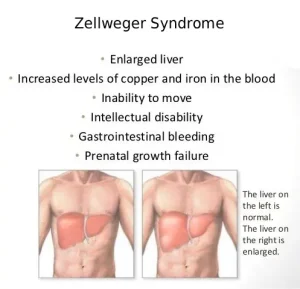Overview
Diagnosis
Diagnosis of Zellweger syndrome is typically made in early infancy based on clinical symptoms, laboratory findings, and genetic testing. Healthcare professionals use a combination of physical examination and specialized tests to confirm the disorder.
Common diagnostic approaches include:
-
Physical examination to identify features such as poor muscle tone, feeding difficulties, seizures, and distinct facial characteristics.
-
Blood and urine tests to measure levels of very long-chain fatty acids (VLCFAs) and other substances that are abnormally high in people with Zellweger syndrome.
-
Brain imaging, such as MRI or CT scans, to detect structural abnormalities that may be present in the brain and nervous system.
-
Genetic testing to confirm mutations in the PEX genes, which are responsible for peroxisome formation and function. Identifying these gene changes helps confirm the diagnosis and also allows for family genetic counseling.
Because Zellweger syndrome is a rare inherited condition, early diagnosis through newborn screening or genetic testing in families with a history of the disorder can help with early management and support planning.
Treatment
There is currently no cure for Zellweger syndrome. Treatment focuses on managing symptoms, preventing complications, and improving the quality of life for affected children. Management typically involves a team of specialists, including pediatricians, neurologists, nutritionists, and genetic counselors.
Treatment options and supportive measures may include:
-
Nutritional support to help manage feeding difficulties, which may include special diets or feeding tubes.
-
Seizure control using prescribed anticonvulsant medications.
-
Physical and occupational therapy to help with motor skills, although developmental delays are often severe.
-
Vitamin supplementation, such as fat-soluble vitamins (A, D, E, and K), to support metabolic processes and reduce deficiencies caused by peroxisomal dysfunction.
-
Hearing and vision care to address sensory impairments that often occur in children with Zellweger syndrome.
-
Regular monitoring of liver function, kidney function, and growth to detect complications early.
Because the condition is progressive, supportive and palliative care play an essential role in maintaining comfort and addressing individual needs. Families are also encouraged to seek genetic counseling to understand inheritance patterns and future reproductive options.
Outlook
The prognosis for Zellweger syndrome remains poor, as the disorder significantly affects multiple organ systems. Most infants with severe forms of the condition do not survive beyond the first year of life. However, early diagnosis, multidisciplinary care, and supportive treatments can help improve comfort and extend survival in some cases.
Ongoing research into gene therapy and peroxisome biogenesis may offer potential future treatments, but currently, management focuses on improving quality of life and providing comprehensive family support.
Advertisement

